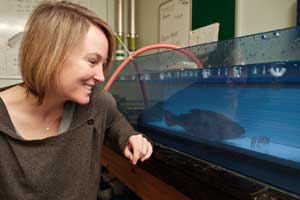Something fishy going on in Life Sciences
07 Nov 2013
Investing in Success is a £1 million initiative to boost staff development that has resulted in a fascinating array of projects which show just how passionate our people are about their work here at the University.

The exciting opportunity to study live fish and other aquatic vertebrates, such as salamanders, frog and axolotls, in realistic environmental conditions in the lab has been made possible with an IIS a grant to bring a water flume respirometer up to scratch.
Dr Holly Shiels, Senior Lecturer in Life Sciences, who made the successful bid, is very enthusiastic.
“Our undergraduate students can now investigate whole animal in-vivo physiology, movement and energetics, in a non-invasive manner,” she says. “They can see how animals respond to changes in water speed, oxygen levels, temperature and aquatic acidification.”
The water flume, essentially a tank the size of a dining-room table, creates a closed environmentally-controlled respirometry system.
Studying whole animal responses has great appeal for many biology and zoology undergraduates who spend much of their degree investigating lower levels of biological complexity.
“The environmental control features of the swim flume appeal to a growing number of our students who are concerned with global environmental challenges,” says Dr Shiels. “The can gain undergraduate experience that could prepare them for job opportunities in water and food security and ecosystem services.”
The water flume respirometer, worth £20,000, a gift from retiring colleagues at the University of Birmingham, needed refurbishing and upgrading.
“Not only our undergraduates, but also our postgraduates benefit from this functional kit. We can provide research projects where students gain niche training in non-invasive whole animal in-vivo biology.”
Her research focus is on cardiac physiology in ectotherms, using physiological approaches to understand how hearts survive environmental change.
As Programme Director of the Biology degree, Dr Shiels says “The demand for this sort of project is overwhelming,” she says. “I’ve had a waiting list of students trying to arrange a project a year in advance.”
Share your story
Did you receive funding from the Investing in Success initiative? If so, share your story with us by emailing uninews@manchester.ac.uk.
